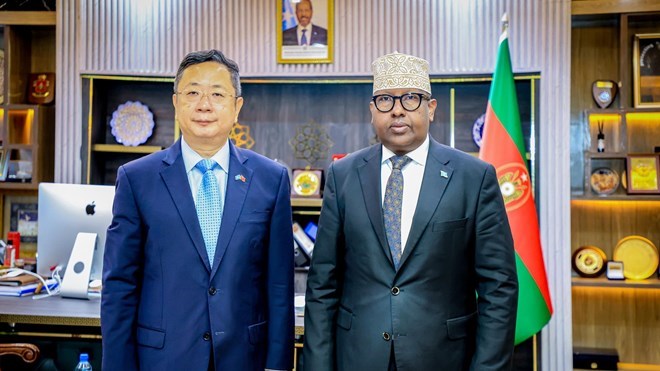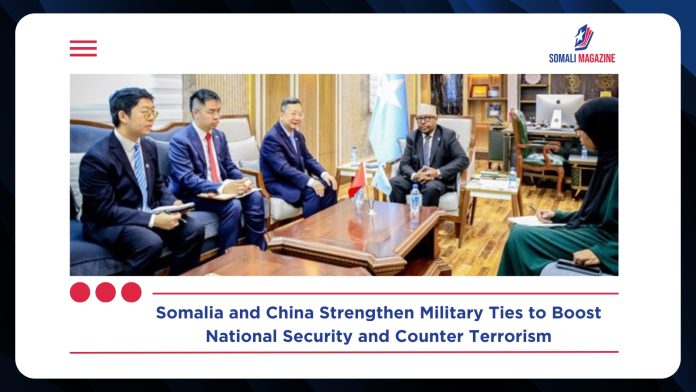Facebook Twitter (X) Instagram Somali Magazine - People's Magazine
The Somali Defense Minister Ahmed Macalin Fiqi met with Chinese Ambassador Wang Yu in Mogadishu this week to strengthen military cooperation between the two nations, with a focus on equipping and training Somali armed forces in the fight against terrorism. The high-level meeting marks a significant step in deepening bilateral ties and enhancing Somalia’s national security capabilities amid ongoing operations against the Al-Shabaab insurgency.
Held at the Ministry of Defense headquarters, the talks centered on expanding China’s support for Somalia’s defense sector, particularly in building the capacity of the Somali National Army (SNA). Ambassador Wang reaffirmed Beijing’s commitment to assisting Somalia in its efforts to restore peace and stability, pledging continued investment in military training, logistics, and infrastructure development.
Minister Fiqi expressed gratitude for China’s longstanding support, noting that the partnership has been instrumental in Somalia’s broader state-building agenda. “Somalia values its strong and growing partnership with China, particularly in building a stable and secure nation,” he said. The minister emphasized that the collaboration goes beyond military aid, extending into development, economic cooperation, and diplomatic engagement.
The meeting comes at a time when Somalia is intensifying its military campaign against Al-Shabaab, a group affiliated with al-Qaeda that continues to pose a serious threat to national and regional security. The Somali government has launched multiple offensives in central and southern regions, with support from international partners including the African Union and the United States. China’s involvement adds a new dimension to Somalia’s security architecture, offering alternative avenues for training and equipment procurement.

Ambassador Wang highlighted China’s respect for Somalia’s sovereignty and its commitment to supporting African-led solutions to African challenges. He reiterated that China’s assistance is grounded in mutual respect and non-interference, aligning with the principles of the Forum on China-Africa Cooperation (FOCAC).
The two sides also discussed the importance of safeguarding national sovereignty and enhancing maritime security, particularly in light of Somalia’s strategic location along the Gulf of Aden and the Indian Ocean. With piracy and illegal fishing still posing challenges, both parties agreed on the need for coordinated efforts to secure Somalia’s territorial waters and protect its economic interests.
This latest engagement reflects the growing diplomatic and security ties between Somalia and China. Over the past decade, China has expanded its footprint in the Horn of Africa through infrastructure projects, humanitarian aid, and peacekeeping contributions. In Somalia, Chinese companies have been involved in road construction, port rehabilitation, and telecommunications, while Beijing has provided scholarships and technical training to Somali professionals.
Analysts view the defense cooperation as part of a broader geopolitical shift, with China seeking to play a more active role in African security affairs. For Somalia, the partnership offers a chance to diversify its international alliances and reduce dependence on Western donors. However, it also raises questions about balancing competing interests in a region marked by strategic rivalries.
As the Somali government continues its push to rebuild national institutions and defeat insurgent threats, partnerships like the one with China are expected to play a critical role. The success of this cooperation will depend on transparency, mutual accountability, and alignment with Somalia’s long-term security and development goals.

